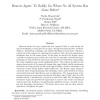Free Online Productivity Tools
i2Speak
i2Symbol
i2OCR
iTex2Img
iWeb2Print
iWeb2Shot
i2Type
iPdf2Split
iPdf2Merge
i2Bopomofo
i2Arabic
i2Style
i2Image
i2PDF
iLatex2Rtf
Sci2ools
AI
1998
Springer
1998
Springer
Remote Agent: To Boldly Go Where No AI System Has Gone Before
Renewed motives for space exploration have inspired NASA to work toward the goal of establishing a virtual presence in space, through heterogeneous eets of robotic explorers. Information technology, and Arti cial Intelligence in particular, will play a central role in this endeavor by endowing these explorers with a form of computational intelligence that we call remote agents. In this paper we describe the Remote Agent, a speci c autonomous agent architecture based on the principles of model-based programming, on-board deduction and search, and goal-directed closed-loop commanding, that takes a signi cant step toward enablingthis future. This architecture addresses the unique characteristics of the spacecraft domain that require highly reliable autonomous operations over long periods of time with tight deadlines, resource constraints, and concurrent activity among tightly coupled subsystems. The Remote Agent integrates constraint-based temporal planning and scheduling, robust multi-t...
AI 1998 | Arti Cial Intelligence | Artificial Intelligence | Goal-directed Closed-loop Commanding | Remote Agent |
| Added | 21 Dec 2010 |
| Updated | 21 Dec 2010 |
| Type | Journal |
| Year | 1998 |
| Where | AI |
| Authors | Nicola Muscettola, P. Pandurang Nayak, Barney Pell, Brian C. Williams |
Comments (0)

